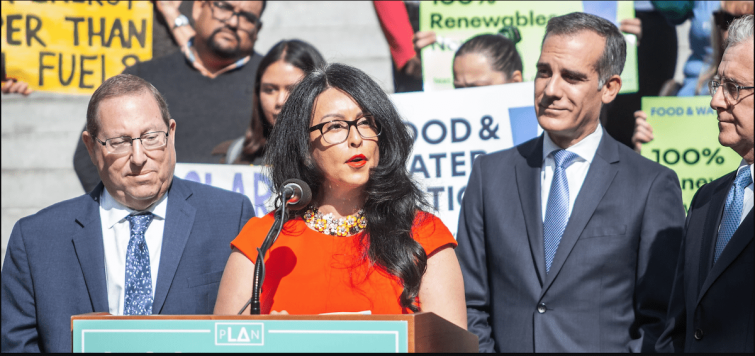LA Approves Major $100M Renter Relief Program
The largest rent relief program of any city in the U.S. will help about 50,000 households
By Greg Cornfield June 24, 2020 6:20 pm
reprints
The Los Angeles City Council this week approved a $100 million emergency relief program for renters and landlords suffering from the economic shutdowns and shelter-in-place orders due to the spreading coronavirus.
The majority of the funds to help apartment dwellers in L.A. — who make up more than 60 percent of the city’s population — will come from the federal Coronavirus Aid, Relief, and Economic Security (CARES) Act. The program could help about 50,000 households, with a maximum of $1,000 per month over a two-month period, or up to $2,000 per household, according to L.A.’s Housing & Community Investment Department.
After the tenant is approved, the grant will be sent directly to the landlord, who will be required to agree to a six-month no-eviction clause.
The program is restricted to tenants earning 80 percent or lower than the average median income, and it is designed so that households earning 30 percent or lower receive half the funding. Registration will be available online or by phone in July, followed by a lottery.
It is the largest renter relief program of any city in the nation. In late May, the New York Legislature approved a similarly sized program for the same reason, but the funds apply to the entire state. California’s Legislature is also working on an unprecedented relief program for renters and landlords, and a massive $25 billion economic recovery fund through future tax vouchers.
Mayor Eric Garcetti’s communications team declined multiple requests for comment for this story. However, he advocated for and helped introduce the plan with City Council President Nury Martinez in May, and indicated in a statement that he intends to immediately sign and approve the program.
The Coalition for Economic Survival (CES), an L.A. tenants’ rights and advocacy group, said the program is a step in the right direction, but does not go far enough. CEO Larry Gross said with unemployment nearing 21 percent in L.A. County, about 365,000 households countywide lost their jobs and do not have access to unemployment benefits, and are at risk of losing their homes once eviction moratoriums expire.
“The total funds are too small and the $2,000 cap per household is too little,” Gross said in an email to Commercial Observer. “Many rents are higher than $1,000 or $2,000, thus this may not be enough to prevent evictions. […] The $100 million in the rental assistance program will make just a small dent in preventing our homeless numbers from exploding.”
Gross is concerned about the funds going to those who need it most, as well as the program’s racial equity, “given that COVID-19 has hit communities of color the hardest.” Similarly, he is hoping to get assurance that landlords who are most in need obtain these funds.
“Limited rental assistance funds should not go to large corporate landlords who can better withstand the current economic crisis. Smaller landlords are more likely to be from the community and support community stability.”
Daniel M. Yukelson, executive director of the Apartment Association of Greater L.A., told CO that his group supports both the city and state’s efforts to provide funding for rental assistance.
“While the funds being allocated will help relatively few of the 365,000 out-of-work Angelenos today […] it is hoped that the city of L.A. can find a way to provide for much more funding for relief to assist both renters and housing providers who are unable to meet ongoing financial obligations due to adverse COVID-19 impacts,” Yukelson said in an email.
But, as renters are given relief through unemployment benefits, eviction moratoriums, rent freezes, and other subsidies, Yukelson said, “for all practical purposes, the city’s housing providers have been left out in the cold.” He said landlords are also struggling to deal with mortgages, property taxes, and maintenance, as well as their own personal expenses “as so many are now facing foreclosure due to lack of rental income or even job loss or infliction with the virus themselves.”
L.A.’s renter relief plan stems from a similar program the city established for renters who faced “rent gouging” increases before the new statewide rent control law was enacted on January 1. The new program will function similarly to how it did in the winter.
“I am reminded every day during this ongoing pandemic that people, especially those in disenfranchised communities, are struggling,” Martinez said in a statement. “This program will help tens of thousands of Angelenos, and that’s wonderful. My concern remains that we need substantially more assistance from the White House and our federal government if we are going to meet the housing needs of Angelenos and people throughout the nation.”
In addition to the $100 million, several council members including Martinez, Herb Wesson, Mitch O’Farrell, Paul Koretz and John Lee, earmarked about $3 million in discretionary money toward the program.
“Much more is needed, but this $100 million rent subsidy program is a great start,” O’Farrell said. “Previously, I allocated an additional $1 million for distressed renters in my district. The recovery will be hard enough without people having to worry about how to stay housed and put food on the table while meeting their financial obligations.”


